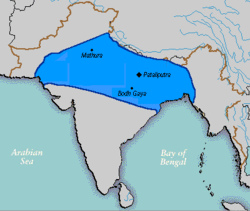yes!!!!!!
main thik ho gayi...although there is some weaknes...but ...mitti dalo un baaton par...bekaar ki baatein...🤢
so here is my next update...
its painful...kamzor dil wale ise naa padhen...khaskar ki magadh premi...🤢
The decline of Mauryan Empire...😭
Ashoka was followed for 50 years by a succession of weaker kings. Brhadrata, the last ruler of the Mauryan dynasty, held territories that had shrunk considerably from the time of emperor Ashoka, although he still upheld the Buddhist faith.
Sunga coup (185 BCE)
Brihadrata was assassinated in 185 BCE during a military parade, by the commander-in-chief of his guard, the Brahmin general Pusyamitra Sunga, who then took over the throne and established the Sunga dynasty. Buddhist records such as the Asokavadana write that the assassination of Brhadrata and the rise of the Sunga empire led to a wave of persecution forBuddhists and a resurgence of Hinduism.
Reasons
The decline of the Maurya Dynasty was rather rapid after the death of Ashoka/Asoka. One obvious reason for it was the succession of weak kings. Another immediate cause was the partition of the Empire into two. Had not the partition taken place, the Greek invasions could have been held back giving a chance to the Mauryas to re-establish some degree of their previous power. Regarding the decline much has been written. Haraprasad Sastri contends that the revolt by Pushyamitra was the result of brahminical reaction against the pro-Buddhist policies of Ashoka and pro-Jaina policies of his successors. Basing themselves on this thesis, some maintain the view that brahminical reaction was responsible for the decline because of the following reasons.
- Prohibition of the slaughter of animals displeased the Brahmins as animal sacrifices were esteemed by them.
- The book Divyavadana refers to the persecution of Buddhists by Pushyamitra Sunga.
- Asoka's claim that he exposed the Budheveas (brahmins) as false gods shows that Ashoka was not well disposed towards Brahmins.
- The capture of power by Pushyamitra Sunga shows the triumph of Brahmins.
All of these four points can be easily refuted.
- Asoka's compassion towards animals was not an overnight decision. Repulsion of animal sacrifices grew over a long period of time. Even Brahmins gave it up.
- The book Divyavadana cannot be relied upon since it was during the time of Pushyamitra Sunga that the Sanchi and Barhut stupas were completed. The impression of the persecution of Buddhism was probably created by Menander's invasion, since he was a Buddhist.
- The word 'budheva' is misinterpreted because this word is to be taken in the context of some other phrase. Viewed like this, the word has nothing to do with brahminism.
- The victory of Pushyamitra Sunga clearly shows that the last of the Mauryas was an incompetent ruler since he was overthrown in the very presence of his army, and this had nothing to do with brahminical reaction against Asoka's patronage of Buddhism. Moreover, the very fact that a Brahmin was the commander in chief of the Mauryan ruler proves that the Mauryas and the Brahmins were on good terms.
Another associated point of great importance is the fact that the Mauryan Empire which was highly centralized and autocratic was the first and last one of its kind. If the Mauryan Empire did not survive for long, it could be because of the failure of the successors of Asoka to hold on to the principles that could make success of such an empire. Further, the Mauryan empire and the philosophy of the empire was not in tune with the spirit of the time because Aryanism and brahminism was very much there. According to the Brahmin or Aryan philosophy, the king was only an upholder of dharma, but never the crucial or architecture factor influencing the whole of life. In other words, the sentiment of the people towards the political factor, that is the State was never established in India. Such being the reality, when the successors of Asoka failed to make use of the institution and the thinking that was needed to make a success of a centralized political authority. The Mauryan Empire declined without anyone's regret.
Just imagine...[not imagine tv wala imagine...ofcourse😆] but if the Mauryan empire wouldn't have declined at that time or the successors of Ashoka were capable enough...What would be the present like????? After reading the post if any such idea or thought comes to ur mind...kindly share...I really do want to know....😉 Ans this time I am serious because at the end of almost my every post...I ask u guys a question but no one answers...😡...bahut nainsafi hai!!!!!!😆 after all sirf history padhna hi nahi history discuss karna bhi interesting hota hai ...if u agree hit the like button...😲
